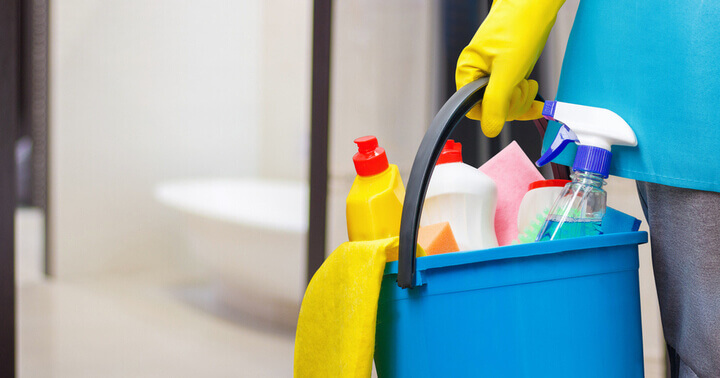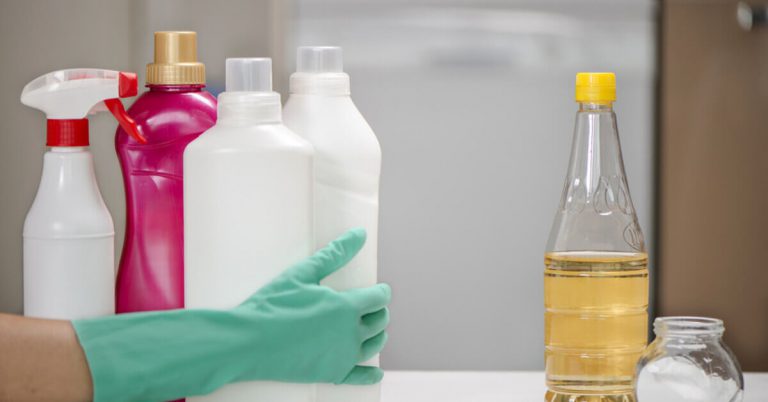Homebrew cleaners versus corporate chemicals… which would you choose? While store bought cleaning products provide great convenience, it’s time to take stock of rising costs as well as to avoid chemicals that could be potentially harmful to your household members. Regardless of who is in-charge of housekeeping, let’s go back to basic!
Washing the dishes

Dish washing and laundry are two main household chores that most families do regularly, if not daily. The importance of choosing a non-toxic dishwashing liquid is important as you or your domestic helper would be soaking your hands in it several times a day. Dry and cracking hands are probably the least of health problems that toxins in these cleaning products could cause!
Artificial fragrances, foaming agents and phosphate (water-softening mineral) are ingredients that could cause skin irritation and longer term health deterioration, not just for the ones who are doing the household chores. Hence, choose products with ingredients that are plant-based or learn how to create a natural multi-function cleaning solution with ingredients that you probably already have at home. (See end of article for a summary of natural ingredients.)
Doing the laundry

Be mindful of “phthalates” – a common ingredient used in various household items such as laundry liquids. This chemical has been linked to asthma, obesity, altered reproductive development and male fertility issues amongst other risks. So, be sure to read the labels and opt for safe commercial detergents.
Green alternative: a homemade laundry detergent, which is a mixture of washing soda, castile soap, baking soda (it helps to brighten), and vinegar. For fragrance, you can add pure essential oils of your preference.
#TiqOurWord Some conventional cleaning products have warning labels such as “Flammable!” or “Toxic!”, which should give you an inkling of how dangerous they could be.
Mopping the floor
Cleaning wood furniture or hardwood flooring? Instead of a purchasing a floor cleaner, try a combination of olive oil, vinegar and water. The ratio will vary depending on the type of wood and finish you have on it. For other type of floorings, warm water with distilled white vinegar, rubbing alcohol, a few drops of eco-friendly liquid dish soap will suffice. Adding some essential oil (think peppermint!) would give off a nice non-toxic fragrance.
#TiqOurWord Patience, mutual care and communication are key to improving relationships. Share these green cleaning tips with your domestic helper so that she can help to take better care of your household.
Cleaning the windows

Commonly found in window cleaners as well as bathroom and toilet cleaners, ammonia is harmful for people with asthma, and the vapour can irritate the eyes, skin and throat. Note that ammonia mixed with products containing chlorine bleach (sodium hypochlorite) will create toxic chloramine gas, which has been known to cause severe respiratory irritation and tissue damage. Greener alternatives for cleaning window includes simple mixtures of water and vinegar or lemon juice. You can use a newspaper to wipe or a clean old cotton rag.
#TiqOurWord Accidents do happen. Protect your domestic helper with ePROTECT maid insurance that covers personal accident, and hospitalisation & surgical expenses in the unfortunate event of an accident. Learn more here.
Cleaning the bathroom

- Sodium hydroxide (sometimes called lye) are very corrosive and can cause skin and respiratory irritation
- Triclosan (also known as “active ingredient” for anti-bacteria product) can be irritating to the eyes and skin, and extensive use may affect hormones or lead to antibiotic-resistant bacteria, limiting treatment options for microbial infections.
- Coal tar dyes, derived from petrochemicals, may contain trace amounts of harmful heavy metals like arsenic and lead, which can be absorbed through skin and affect the nervous system.
You may already have the items that is required for an all-natural bathroom cleaner. Use baking soda and vinegar as a toilet scrub, and borax as a tile scrubber. For fragrance, lemon juice or essential oils can be added to your mixture.
Summary of green cleaning items at home:
| Basic ingredients | Functions |
| Baking soda | Also known as sodium bicarbonate, this base mineral is very versatile and reacts with acids such as lemon and vinegar. It can be a gritty scrubber and stain remover. |
| Borax | An alkaline mineral salt with a powdery white appearance that can be used to disinfect, whiten and deodorise. |
| White vinegar | Common condiment that’s also good for disinfecting and loosening dirt. |
| Lemon juice | Natural disinfectant and stain remover with citrus scent that’s great for deodorising. Great for removing grease from the stove and countertops too. |
| Olive oil | Beyond a cooking staple, it’s a natural cleaning tool that can nourish surfaces and loosen stains, grease, and grime. Ideal for polishing wood too. |
| Castile soap | Made only from vegetable oil, this is an all-purpose foaming cleaner that can come in either bar or liquid form. |
| Washing soda | Also known as sodium carbonate, this highly alkaline powder is an effective solvent for a wide range of stains. It can be used as water softener, caustic cleaner and laundry supplement, etc. |
Why choose natural homemade cleaners?
- Cost-effective
- Less toxic than commercial cleaners
- Easy to use
- Environment friendly
Going green
Chemicals can be absorbed into the skin or breathed in by anyone at home, especially the one who’s doing the chores. Making the switch from commercial household cleaning products to more natural, green homemade cleaners is a great step towards a healthier and more cost-effective lifestyle, not to mention contributing to an eco-friendly environment. So, start today!
[End]
Information is accurate as at 16 September 2019. This policy is underwritten by Etiqa Insurance Pte. Ltd. (Company Reg. No. 201331905K). Protected up to specified limits by SDIC.
Tiq by Etiqa Insurance Pte. Ltd.
A digital insurance channel that embraces changes to provide simple and convenient protection, Tiq’s mission is to make insurance transparent and accessible, inspiring you today to be prepared for life’s surprises and inevitabilities, while empowering you to “Live Unlimited” and take control of your tomorrow.
With a shared vision to change the paradigm of insurance and reshape customer experience, Etiqa created the strong foundation for Tiq. Because life never stops changing, Etiqa never stops progressing. A licensed life and general insurance company registered in the Republic of Singapore and regulated by the Monetary Authority of Singapore, Etiqa is governed by the Insurance Act and has been providing insurance solutions since 1961. It is 69% owned by Maybank, Southeast Asia’s fourth largest banking group, with more than 22 million customers in 20 countries; and 31% owned by Ageas, an international insurance group with 33 million customers across 16 countries.
Discover the full range of Tiq online insurance plans here.







